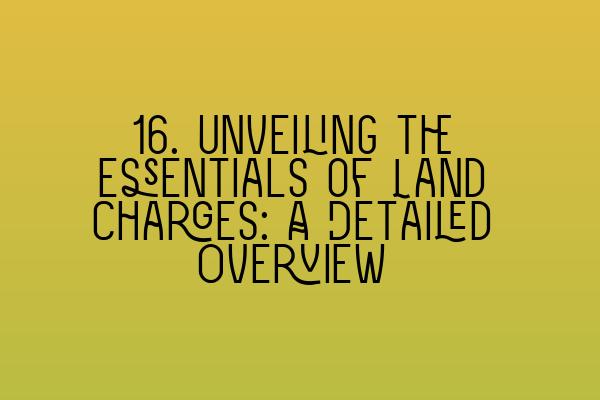16. Unveiling the Essentials of Land Charges: A Detailed Overview
When it comes to property law, understanding land charges is essential. Whether you are buying, selling, or dealing with land transactions, knowledge of land charges is crucial to ensure a smooth and legally sound process. In this article, we will delve into the fundamentals of land charges, providing you with a comprehensive overview.
What are Land Charges?
Land charges are restrictions, burdens, or obligations that are registered against a property or land. They provide notice to anyone who may be interested in the property about existing rights or claims. Land charges can affect the use, ownership, or transfer of the property, and failing to consider them can result in significant legal and financial consequences.
The Different Types of Land Charges
There are various types of land charges that can be registered against a property. Understanding these different categories is crucial when dealing with land transactions:
- Local Land Charges: These are registered against the property itself and include matters such as planning permissions, tree preservation orders, and enforcement notices. They are essential for buyers and lenders to be aware of the local authority restrictions and obligations that may affect the property.
- Classified Charges: Also known as class C(ii) land charges, these relate to properties that are leased or used by religious organizations for the purpose of religious worship. They provide notice of interests or restrictions from the Church of England.
- Land Charges Register: The Land Charges Register contains charges that are not registered against the property itself but against the person. These charges typically include bankruptcy and other insolvency-related matters, as well as matrimonial-related charges such as financial settlements.
- Chancel Repair Liability: Chancel repair liability, although no longer a land charge, can still have a significant impact on properties located in parishes historically subject to this liability. It is crucial to understand if the property is affected by this liability to avoid any unexpected financial burdens.
- Restrictive Covenants: Restrictive covenants are agreements between parties that restrict the use or development of land. They can be found in title deeds or other legal documents relating to the property. It is essential to identify and understand any restrictive covenants that may affect the property’s potential for development or use.
The Importance of Land Charges Searches
Before purchasing or transferring a property, it is crucial to conduct comprehensive land charges searches. These searches reveal the existence of any registered land charges that may impact the property’s title or use. Failure to complete these searches can lead to unexpected liabilities or disputes in the future.
By conducting land charges searches, buyers, sellers, and lenders can identify any potential issues and make informed decisions. It is advisable to involve a property law solicitor who specializes in land law to ensure a thorough examination of the property’s title and any associated land charges.
Conclusion
Understanding land charges is vital when dealing with property transactions. Being aware of the different types of land charges and conducting comprehensive searches can help mitigate any potential risks or complications. Consulting with a property law solicitor who has expertise in land law is crucial for a smooth and legally compliant property transaction.
For more information on the SQE (Solicitors Qualifying Examination) and to enhance your understanding of property law and land law, please check out our related articles:
